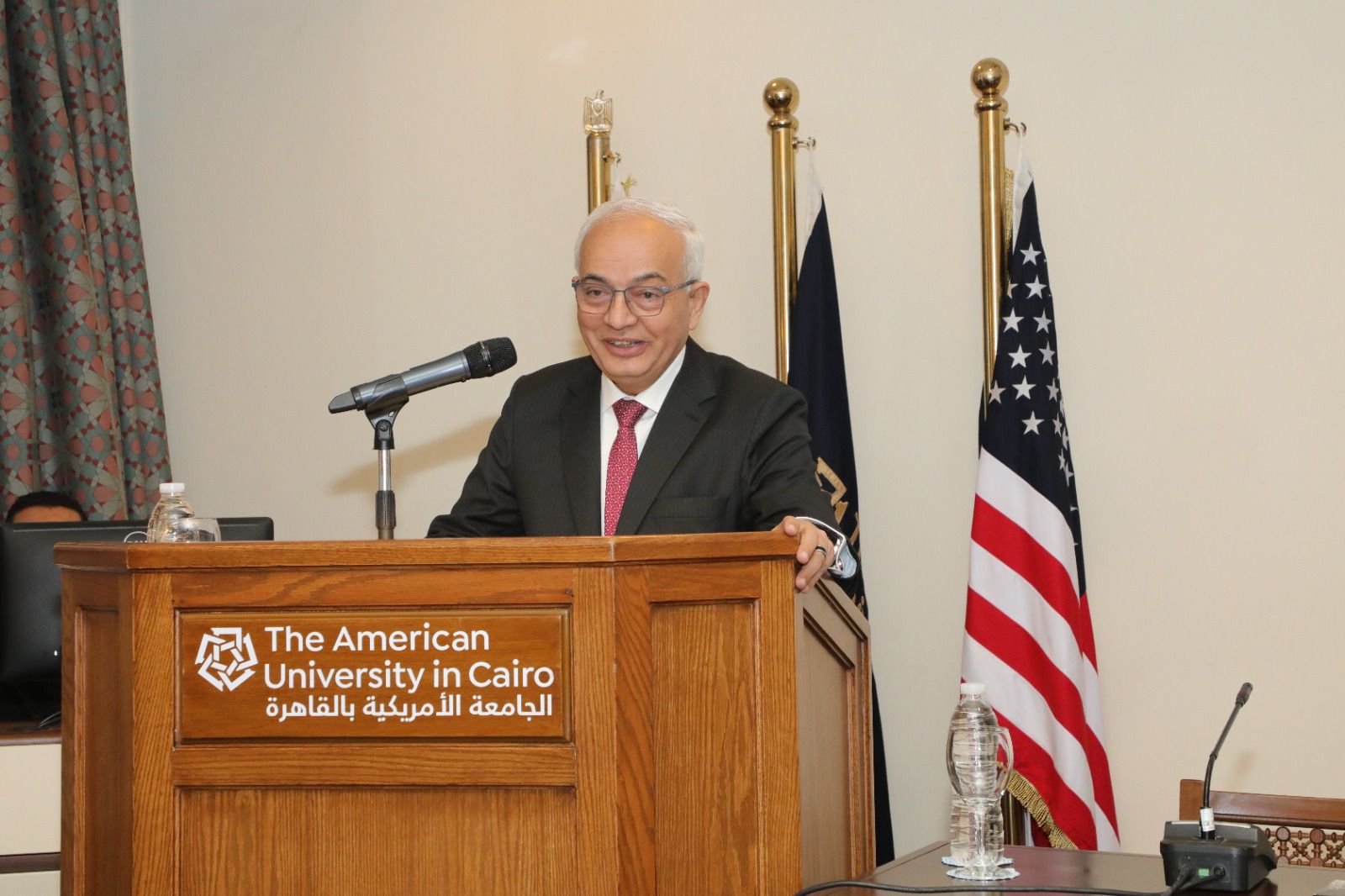The Minister of Education participates in the “Regional Expert Conference

Dr. Reda Hegazy, Minister of Education and Technical Education, participated today in the “Regional Expert Conference on Promoting the Arabic Language in Education to Build More Inclusive Societies,” which is organized by the American University in cooperation with the Prince Sultan bin Abdulaziz Al Saud Charitable Foundation and the UNESCO Regional Office in Beirut.
This came in the presence of Dr. Ahmed Dalal, President of the American University in Cairo, Dr. Tariq Shawky, former Minister of Education and Chancellor of the American University, Saleh Ibrahim Al-Khulaifi, Director General of the Prince Sultan bin Abdulaziz Al Saud Foundation, and Fadi Yaraq, Education Advisor at the UNESCO office in Beirut.
At the beginning of his speech, Dr. Reda Hegazy praised the title of the conference, the topic of which was chosen to be (Promoting the Arabic language in education to build more inclusive societies), stressing that the conference comes within UNESCO’s efforts to preserve Egyptian identity in the face of other cultures, and to emphasize the consolidation of belonging.
Dr. Reda Hegazy pointed out that this meeting comes within the cooperation project that works on many projects, events and initiatives within the framework of its goals to promote the Arabic language, as the effective strategic partnership between UNESCO and the Prince Sultan Foundation has contributed to supporting interest in the Arabic language as a channel for bridging the gap between different cultures. And creating civilized communication with others, and achieved great successes in this field on several levels.
The Minister stressed that there is no doubt that language is identity and the vessel of thought, and a person can only think through his mother tongue, and if a person masters his mother language, he can learn more than one language.
The minister said that the "Transforming Education" summit in New York revealed that 70% of poor and middle-income countries are unable to read simple text. He stressed that the ministry is using modern strategies represented in combining the phonetic input and the partial method, and teaching grammar to enable the student to communicate and taste the language.
The minister pointed out that the child learns the colloquial language at home and learns it in the classical language at school, and he develops a dual language, which results in a lack of familiarity with the language and a lack of interest in learning it, stressing the importance of free reading in strengthening the language among students.
The Minister continued, stressing the importance of maximizing the role of modern technology means, such as platforms, in spreading the classical language among individuals, employing it for the benefit of the Arabic language, and providing a dynamic platform for teachers. Life issues must also be included in books and reading texts to enable the student to communicate and express himself, stressing that the primary stage curricula include A list of life skills, which is one of the principles on which the Arabic language curriculum is based, noting the importance of focusing on developing all skills in reading, writing, listening, and reading comprehension.
The minister said that language has a fundamental value in the life of every nation, as it is the tool that carries ideas and conveys concepts, thus establishing communication links between the people of one nation, and it is also considered one of the basic components of cultural belonging.
The minister continued that the Arabic language gains its importance from being the language of the Holy Qur’an. In addition, it is the strongest bond in supporting communication between the people of the Arab nation, and the expression of their conscience, identity and personality, the stock of their intellectual, scientific and creative heritage and the vessel of their authentic Arab civilization, especially in light of the current regional and international circumstances and changes.
Dr. Reda Hegazy pointed out that the Ministry of Education and Technical Education spares no effort to advance the Arabic language and improve it, by developing Arabic language curricula at all educational levels, in a way that preserves its authentic heritage and keeps pace with the developments of the era in which we live.
At the conclusion of his speech, the Minister extended his sincere thanks and appreciation to all those who contributed their efforts to organizing this important conference, wishing all its participants success and success, holding rich and successful discussion sessions on its topics and coming up with a serious vision from which real, implementable work programs emerge.
For his part, Dr. Ahmed Dalal, President of the American University, expressed, during his speech, his happiness at participating in this conference. This is in order to strengthen the Arabic language, express oneself in life, and normalize it to express the diverse interests of our children and specialists. These are the same principles on which the communicative and applied approach is based.
He added that the American University seeks, through the conference, to develop ways to apply the communicative approach more broadly to enhance the Arabic language, praising the fruitful cooperation with the Ministry of Education over the years through developing curricula for teaching the Arabic language in schools in a deeper and more comprehensive way than just focusing on controlling grammatical rules.
The President of the American University continued, saying: “We seek to participate in empowering the Arabic language effectively, in addition to the participation of teachers in the development process to motivate students to use the Arabic language correctly, making it more relevant to the student’s daily life.”
In his speech, Dr. Saleh bin Ibrahim Al-Khulaifi, Director General of the Sultan bin Abdulaziz Al Saud Charitable Foundation, expressed his happiness at participating in this conference, stressing that the Foundation has taken it upon itself years ago to adopt programs to support the Arabic language through multiple channels and events and international partnerships with many organizations. These partnerships have resulted in a broad movement, which has contributed to increasing interest in the Arabic language, especially in non-Arabic speaking communities.
